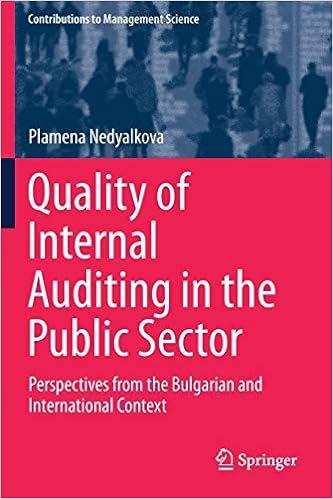Question
Accounting problems need help with 1. The following information relates to Company ABC for June 2015. Cash balance per Bank $23,499 NSF fee $5.60 Interest
Accounting problems need help with
1. The following information relates to Company ABC for June 2015.
| Cash balance per Bank | $23,499 |
| NSF fee | $5.60 |
| Interest earned on bank balance | $18.32 |
| Cheque printing charge | $2.50 |
| Outstanding cheque (printing expense) | $379 |
Which of the following is correctly part of the bank reconciliation process for February 2015?
A. Adjust the cash general ledger to record a debit due to interest earned on bank balance $18.32
B. Add NSF cheque returned to cash balance per general ledger
C. Record the outstanding cheque to printing expense $379
D. Adjust the general ledger for the NSF fee with a debit to cash of $5.60
E. Add the outstanding cheque of $379 from the balance per bank statement
2.
At the end of the month of July you close the books of your company and received the bank statement. You are ready to start with the Adjusting journal entries and realized that a bank reconciliation must be performed.
First you collect the data from June 30th reconciliation as follows:
| Balance per Bank | $10,000 |
| add: Deposits in Transit | $6,300 |
| deduct: Outstanding Cheques | $(5,000) |
| Balance per Books | $9,600 |
Second you close your update your Cash and bank account with all transactions recorded before AJE and you have:
| Balance July 31 | $11,000 |
| Deposits | $8,500 |
| Cheques | $6,500 |
Third you look at the bank statement provided by your bank and you see the following:
| Balance July 31 | $10,280 |
| Deposits | $13,000 |
| Cheques | $10,000 |
| Note collected | $700 |
| Bank service charge | $ 50 |
| NSF cheque | $1,000 |
| Interest received | $180 |
| Autowithdrawals | $250 |
. Which of the following items have been deducted from the Cash and Bank account when doing the reconciliation?
A. Notes Collected $700
B. Interest $180
C. NSF Cheque $1,000
D. Errors $30
E. None of the others alternatives are correct
3. The purpose of maintaining a petty cash fund is:
A. Purchases to be made when the purchaser does not want his/her manager to know and he/she does not need the manager to sign a cheque if he/she uses petty cash.
B. Replaces a bank savings account which can be subject to high bank charges.
C. None of the others alternatives are correct
D. Emergency funds in case of capital asset purchase.
E. Small purchases instead of writing a cheque.
4.
At the end of the month of July you close the books of your company and received the bank statement. You are ready to start with the Adjusting journal entries and realized that a bank reconciliation must be performed.
First you collect the data from June 30th reconciliation as follows:
| Balance per Bank | $10,000 |
| add: Deposits in Transit | $1,800 |
| deduct: Outstanding Cheques | $(2,200) |
| Balance per Books | $9,600 |
Second you close your update your Cash and bank account with all transactions recorded before AJE and you have:
| Balance July 31 | $12,000 |
| Deposits | $7,300 |
| Cheques | $4,800 |
Third you look at the bank statement provided by your bank and you see the following:
| Balance July 31 | $12,430 |
| Deposits | $6,000 |
| Cheques | $4,000 |
| Note collected | $1,000 |
| Bank service charge | $20 |
| NSF cheque | $150 |
| Interest received | $200 |
| Autowithdrawals | $500 |
Which of the following items have been added to the Cash and Bank account when doing the reconciliation?
A. None of the others alternatives are correct
B. Notes Collected $1,000
C. Autowithdraws $500
D. Service Charges $20
E. NSF Cheque $150
Step by Step Solution
There are 3 Steps involved in it
Step: 1

Get Instant Access to Expert-Tailored Solutions
See step-by-step solutions with expert insights and AI powered tools for academic success
Step: 2

Step: 3

Ace Your Homework with AI
Get the answers you need in no time with our AI-driven, step-by-step assistance
Get Started


